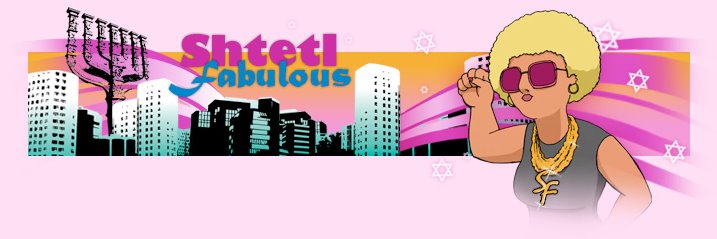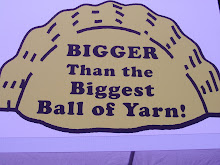For someone whose blog title features a Yiddish word, I've had a rather ambiguous relationship with the language. Wikipedia defines a shtetl as a small town with a large Jewish population in pre-Holocaust Europe. While my hometown would be more aptly described as a Mormon shtetl, being from the suburbs versus the city (aka ghetto), shtetl fabulous nonetheless seemed like a good choice to describe myself.
Starting back in the 10th Century CE, Jews in Germany began mixing Hebrew with the local Rhineland dialects to create their own language. They used Hebrew letters and a mostly German vocabulary to build Yiddish and it spread throughout Eastern Europe, reaching its peak from the 18th to the early 20th Centuries.
Once considered a dead language, you can still hear plenty of Yiddish spoken in the Orthodox enclaves of Brooklyn, Monsey, Lakewood, Bnei Brak and Montreal. But with the recent rise in Jewish cool, more liberal and secular young people are digging up the etymologies of words like "bagel," "nudge," and "deli," and coming up Yiddish.
While I love Mel Brooks, I'm all for rediscovering one's heritage and I'm guilty of peppering my speech with ample "shlepps," "schmucks," "tzatchkahs," I have mixed feelings about Yiddish.
My father's family came from Lithuania and Russia before WWII and spoke Yiddish regularly. But my mother's side, who I more strongly identify with, came from Hungary and lived very assimilated lives before the War. They didn't speak Yiddish and neither did millions of other Jews in North Africa, the Middle East and Southern Europe.
However, Yiddish has so fully permeated American Jewish culture, that my mother still bought me a comprehensive collection of Yiddish magnetic poetry that any visitor to my apartment will confirm plays a dominant role on my refrigerator. Do I know what half of the words mean? Meh. Maybe half. Could I actually read a sentence written in Yiddish? Doubtful, even though I can read and speak modern Hebrew.
We have romanticized the experiences of the Jewish community on the Lower East Side and of the now mostly-abandoned Jewish communities of Eastern Europe where Yiddish flourished. Yet these were hardly good ol' days. On the LES, we lived in squalor and many of went to early graves, the victims of rampant disease and sweatshop disasters. Even worse, Jews in Russia and Poland faced pogroms and ultimately the Holocaust where millions of Yiddish speakers left this world like sheep to the slaughter. Do I really want to embrace a language that represents modern Judaism's darkest hour?
Then there's that tricky issue of geography and deciding whose past we're choosing to embrace when we speak Yiddish. Even it its peak, Yiddish was hardly universal and for some could represent another division in our global Jewish community. Maybe Hebrew is the better choice as the common language of prayer.
Hollywood has always had a fondness for the expressiveness of Yiddish and plenty of movies and television shows feature Yiddish phrases, including Mike Myers' "Coffee Talk" charater Linda Richman. Even non-Jews love Yiddish - just check out the Spiderman comics, Emmy-award winning musical "In the Heights," and several episodes of The West Wing.
In the Esperanto-esque dialects of our modern lives, we can all make a little room for (and a little peace with) Yiddish. We might not go out and read untranslated Sholom Aleichem or sign up for a seder in Williamsburg, but maybe we can be unafraid of calling the guy who cut us off in traffic a putz. Or replacing our homeboys with landsman. Or even kvelling that Barack Obama's acceptance speech gave us shpilkes. Zayt Gezunt.
Thursday, September 4, 2008
Subscribe to:
Post Comments (Atom)


3 comments:
I know we talked about this tonight, and your post gave me some food for thought. I think I might post a response on Random Babbles tomorrow.
Oh, and I think I disagree... I'm not sure Obama gave me schpilkes... no ants in my pants (how my rabbi growing up described this Yiddish word)... I guess I felt more nachas than anything else.
Cute post. I can speak like 5 words of Yiddish and most of them are words that even non-Jews know. My Mom actually learned Chumash translated into Yiddish in her elementary school, so she can speak it and understand. But she doesn't really have anyone to speak it with. Her mom does speak and understand but I think they mostly spoke Hungarian when my Bubby was growing up. My 1st cousins who are Hassidic and live in Boro Park only speak to their children in Yiddish and the kids go to Yiddish speaking schools. I can barely talk to the kids.
Yiddish does not necessarily equate with "the darkest hour" of European Jewry. And there is so much more to the Yiddish language than 'kvelling' and 'putz'. There are novels and poems and stories and it gives you a chance to connect to a whole generation of people (survivors and enthusiasts) who you would have never spoken to if it wasn't for Yiddish. Just because there is modern Hebrew, there is no reason to throw out a 1,000 of Jewish history.
Post a Comment